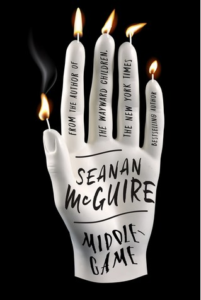Finished reading this last Hugo nominee for Best Novel right before the buzzer, and wow is my brain tired! So many interesting concepts and some really great, fun writing throughout the many books and stories I’ve covered for/off this slate. My right eye is still twitching even as I type these words, tho some of that may have to do with the stress of having five books to read and review over the next ten days when all I want to do is maybe take a break from reading for a week. No rest for the wicked awesome, tho (plus one of those books is HARROW THE NINTH *fangirl squealing*.)
 But to Middlegame, which had the virtue of Seanan McGuire’s readable, engaging prose to carry me through its 400-odd pages as I careened towards the voting deadline. Roger and Dodger are twins who were separated at birth in a grand alchemical experiment to embody the Doctrine of Ethos, with one twin representing language and the other mathematics. While still children, they manage to start communicating with one another despite being on opposite American coasts, but a series of catastrophes causes them to keep falling apart. As they get older, they discover what they really are and who made them, a discovery that could risk both their lives and that of countless others.
But to Middlegame, which had the virtue of Seanan McGuire’s readable, engaging prose to carry me through its 400-odd pages as I careened towards the voting deadline. Roger and Dodger are twins who were separated at birth in a grand alchemical experiment to embody the Doctrine of Ethos, with one twin representing language and the other mathematics. While still children, they manage to start communicating with one another despite being on opposite American coasts, but a series of catastrophes causes them to keep falling apart. As they get older, they discover what they really are and who made them, a discovery that could risk both their lives and that of countless others.
It’s an interesting concept based on at least one cool literary conceit, but I was exhausted after reading it, mostly from Ms McGuire’s almost unceasingly portentious tone. Too much portentiousness too often threatens to slip over into pretentiousness: the book takes itself as seriously throughout as the villain takes himself and that, my friends, is exhausting. I recognize that this solemnity is a trademark of Ms McGuire’s writing, but it’s far easier to stomach in the novellas of the Wayward Children series than in a much lengthier novel. Notably, the treatment of parents in Middlegame was much more fair-minded than in said series, with a lot of stress on the good of adoption.
Aside from tone, I was also put off by the extended scene with Erin in Smita’s lab, which felt infinitely gratuitous. In truth, it read like something spliced off from a different project, as if written separately and in more detail, in homage to slasher movies: fine of itself, but obviously grafted on to the rest of the text. I was also disappointed by where the twins ended up while searching for the Impossible City and fighting off Leigh: I’d expected something less prosaic, tbh. I understand the beauty of what they did in the ruins, but it still felt like a let-down after the build up as to how metaphysical it and the Improbable Road were meant to be. The lab was pretty well-realized tho, and I imagine the questions raised regarding Asphodel and James will be solved in the next novel in the series. Do I care to pick it up when it comes out tho? I’d say there’s a 33.3% probability.
Anyway, I need to plunge back into reading, and since all five of the books I have scheduled next are for CriminalElement.com, it will be a little while till you see me here again! But I’ll hopefully be back with reviews of Paul Tremblay, P Djeli Clark and Pierce Brown (totally coincidental that all their names start with P,) if my brains haven’t trickled out my ears before then. Oh, and perhaps coverage of how the Hugo results inevitably diverge from my carefully considered ballot! See you soon!
